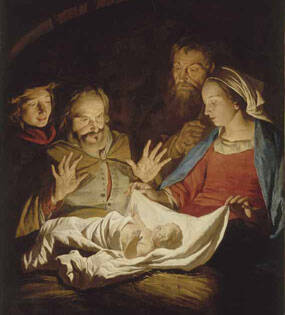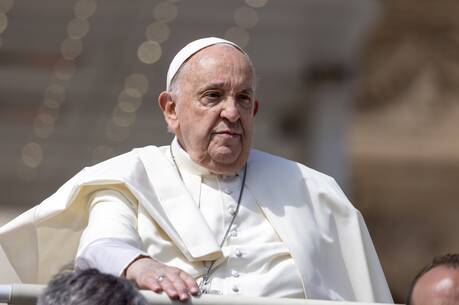St. Ignatius Loyola’s classic text, The Spiritual Exercises, leads a person by a series of imaginative meditations through the life of Christ. And Ignatius asks the retreatant to begin before the earthly life of Jesus even began.
In one of the loveliest of his meditations, St. Ignatius asks us to imagine the Holy Trinity in heaven. Looking down, they gaze upon all of humanity and see men and women greatly diverse in dress and behavior: “some white and others black, some at peace and others at war, some weeping and others laughing, some healthy and others sick, some being born and others dying....”
In their compassion, they decide that the second person of the Trinity should become human. “And thus when the fullness of time had come, they send the Angel Gabriel to Our Lady,” writes Ignatius. Christmas marks the time when God, out of compassion, became human, or, as the Gospel of John has it, “pitched his tent among us.”
Today the Holy Trinity watches over a world that would be virtually unrecognizable to the men and women in first-century Palestine. Just in the past decade, technological advances have enabled millions, at least in the West, to enjoy better health, increased educational opportunities and other unforeseen advantages. The place of women and minorities continues to improve in our country: the presence of two women and an African-American man in the November presidential election contests is one sign of progress in this regard.
But the Holy Trinity also sees a world surprisingly similar to that of first-century Palestine, a world with “some weeping.” Jesus was born into a violent time. Today terrorism, its complex roots maddeningly confusing, frightens millions, from India to Indianapolis. Likewise, the poor in Jesus’ day were, as today, powerless, marginalized and disenfranchised. Even St. Joseph was not exempt from financial woes. Like Palestinian peasant farmers, as the Rev. John Meier, a noted Scripture scholar, points out, he led a “precarious existence, sometimes at subsistence level.” How similar this is to our world this Christmas, when the poor are still marginalized and millions of middle-class Americans fear for their future in the wake of the frightening collapse of the financial markets.
Into such a place came Jesus: a world riven with differences between rich and poor, facing the threat of violence and, like that world, hoping for salvation. To enter this world, Jesus was born into the Holy Family, each of whose members offers a distinctive lesson for believers during Christmas—especially for those facing hard times, financial or otherwise.
Again we turn to Joseph, who is often relegated to second-class status in the Nativity scenes. A “righteous” man, as the Gospel of Matthew has it, Joseph shoulders the confusing task God has given him. Not only is he asked to accept the strange message from an angel about the miraculous circumstances of his wife’s pregnancy; he is also charged, later, to guard his family in their perilous trip to Egypt. This would have been a particularly hard road for a Jewish family—Egypt lies in the wrong direction. Joseph trustingly accepts God’s upending of his expectations.
Mary’s great yes to God offers not only a model for women, but for any disciple. Indeed, Mary’s encounter with the angel Gabriel offers a model of discipleship for those under duress. When God invites Mary to accept a strange future, she initially hesitates and, like any believer, voices her honest emotions. “How can this be?” she asks in the Gospel of Luke. In reply, the angel points to the example of her cousin, Elizabeth, in essence saying, “Look what God has already done.” How often this happens in our own lives. When doubtful, we are invited to look backward, to see God’s hand more clearly and magnify our trust. But even after Mary’s Fiat, her story provides a lesson. “Then the angel left her.” Then comes the part that we know well: faith.
Mary’s son came, as one hymn has it, “not as a monarch, but a child.” The Word of God chose to dwell among us in that most fragile of human states—as a newborn. When the Magi arrived, they may have wondered, “This little child is the king?” Entering into perilous situations and accepting the need to be protected, to be cared for and to be nurtured by others is another lesson that God offers us at Christmas. “The secret of life,” said Blessed John XXIII, “is to let oneself be carried to God.”
The Holy Trinity chose “in the fullness of time” to enter into the complicated world of first-century Palestine. Christ, in his Spirit and in the church, continues to dwell in our lives. Christians are also called to insert themselves into what is becoming a more complicated world. For ways to do this, we need look no farther than the crèche, to the example of the Holy Family.








